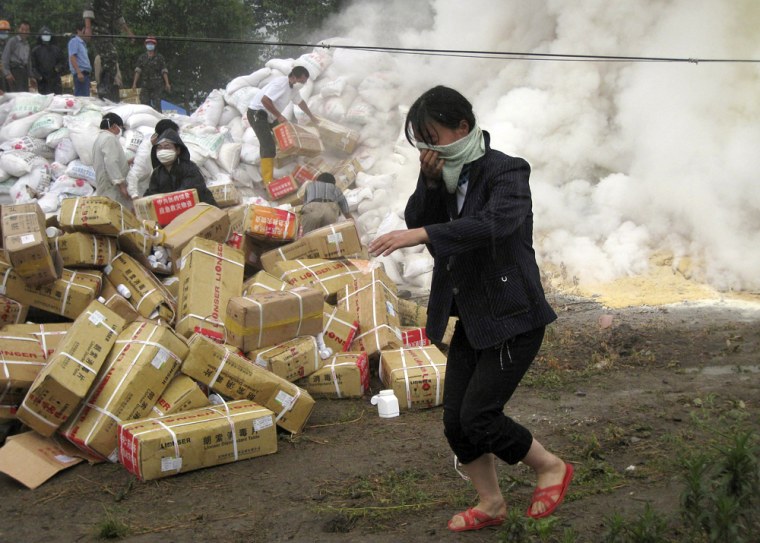Japan has decided not to send its military to deliver relief goods to quake-hit China after Beijing voiced uneasiness over the mission, local reports said Friday.
Beijing was in talks with Tokyo about the sensitive issue of using Japan's military to deliver tents and blankets to quake survivors, which could have become the first significant military dispatch between the two nations since World War II.
But the two sides failed to hammer out details of the dispatch as the Chinese government expressed uneasiness over the mission using Japanese air force planes, Japan's top-selling daily Yomiuri said, quoting government sources.
Japan invaded China and conquered large parts of it in the 1930s before being defeated by the Allies in 1945, and many Chinese still strongly resent Japan for its military aggression.
Many Chinese opposed to relief mission
Japan's major daily Asahi said the Chinese government was concerned about domestic public opinions as many Chinese posted comments opposing the mission on Web sites.
Instead of sending military planes, Japan is now considering using private charter planes to deliver relief goods to China.
Since World War II, Japan has sent only a small group of defense experts to China to dispose of chemical weapons abandoned by Japanese troops.
Though postwar relations between China and Japan have been rocky, the countries have grown closer in the past 18 months.
Chinese President Hu Jintao made a successful five-day visit to Japan at the beginning of May, the first by a Chinese president in 10 years.
During the trip, Hu urged Beijing and Tokyo to put their bitter wartime history behind them and proposed a broad partnership.
Japan was also the first foreign nation that China turned to for help after the earthquake, which has killed nearly 70,000 people and left millions homeless.
Tokyo sent a 60-member civilian emergency rescue team days after the quake struck, followed by a medical team last week.
Heavy rain, chemical fire add to challenges
Meanwhile, heavy rain and a chemical fire hampered urgent recovery efforts on Thursday in an earthquake-shattered town threatened by a rising lake.
State television reported that a stockpile of bleach used to disinfect quake ruins ignited in a storage building, creating heavy fumes and injuring 61 soldiers. Footage showed smoke billowing over the town of Beichuan. Troops were spraying the building and several were gasping for air and being treated by medics.
"The soldiers have inhaled the fumes. It has affected their bodies and they are in the military hospital now," said a soldier identified by CCTV as the leader of the fire crew. His name was not given.
The rain grounded helicopters and hampered work to drain a lake above Beichuan that was formed by when a landslide triggered by the magnitude 7.9 earthquake blocked a river. The lake, dubbed Tangjiashan, has been rising by several yards a day.
Beichuan has been sealed off by troops and officials say it will be rebuilt somewhere new.
Some 158,000 people downstream from the new lake have been evacuated, and officials have pledged to warn other nearby residents in case of flooding so they have time to flee, the official Xinhua news agency reported.
Of 34 lakes created by the earthquake, 28 are at risk of bursting, Xinhua said.
Airlifting in heavy equipment
With roads to the area cut off, helicopters have airlifted heavy equipment to dig drainage channels. Heavy rain prevented aircraft from flying, CCTV reported, but workers were continuing efforts to clear debris despite the weather. The rain was a minor addition to the rising water compared to the river feeding the lake.
In the past three days of around-the-clock work, troops have dug a channel 50 yards wide and 300 yards long, CCTV said.
The government raised the confirmed death toll from the quake to 68,516, with 19,350 people still missing. The increase of about 400 deaths was the smallest since the Cabinet started announcing a toll.
The government has already said it expects the final toll to surpass 80,000.
The military also released some details of the massive recovery effort. Lu Dengming, commander for the area around the provincial capital of Chengdu, said more than 2,500 miles of damaged roads have been repaired and 70 million cubic feet of ruins cleared, the official Xinhua New Agency reported.
Some 178,000 troops, militia and reservists were taking part in the operation, and had delivered more than 510,000 tons of relief materials by land and air, including tents and prefabricated houses and schools, Lu said.
Panda preserve seeks new home
Also Thursday, the head of the world's most famous panda reserve, badly damaged by the earthquake, said it was looking for a new home.
"What I'm worrying about are secondary disasters, such as severe aftershocks," Zhang Hemin, chief of the Wolong Giant Panda Reserve, said by phone. "The road is easily blocked by rocks falling from the mountain. There would be no way to get the food in."
The reserve is just 20 miles from the epicenter of the quake. Five reserve staff members died.
One panda remains missing. Conditions remain so bad that the government last week arranged an emergency food shipment of about 5 tons of bamboo for the 47 pandas still at the reserve. Many panda enclosures were heavily damaged.
Some pandas have been moved to another breeding center in Chengdu, and eight were flown to Beijing last weekend for a previously scheduled stay at for the Olympics.
The government has put business losses from the disaster at $9.5 billion, with estimates of total damage to factories, roads and infrastructure running as high $86 billion.
